

Big Data for All: Privacy and User Control in the Age of Analytics by Omer Tene, Jules Polonetsky. Omer Tene.
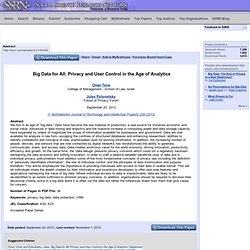
Judged by the Tin Man: Individual Rights in the Age of Big Data by Omer Tene, Jules Polonetsky. Big data, the enhanced ability to collect, store and analyze previously unimaginable quantities of data in tremendous speed and with negligible costs, delivers immense benefits in marketing efficiency, healthcare, environmental protection, national security and more.
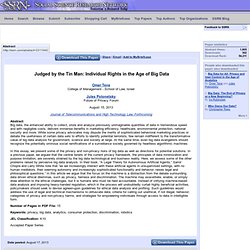
While some privacy advocates may dispute the merits of sophisticated behavioral marketing practices or debate the usefulness of certain data sets to efforts to identify potential terrorists, few remain indifferent to the transformative value of big data analysis for government, science and society at large. At the same time, even big data evangelists should recognize the potentially ominous social ramifications of a surveillance society governed by heartless algorithmic machines. Privacy in the Age of Big Data. February 2, 2012 64 Stan.
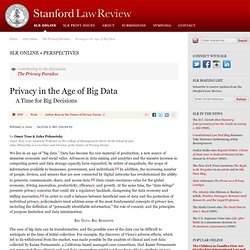
L. Rev. Online 63. Privacy and Big Data. September 3, 2013 66 Stan.
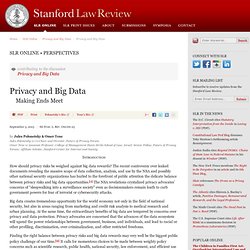
L. Rev. Online 25 Introduction How should privacy risks be weighed against big data rewards? Big data creates tremendous opportunity for the world economy not only in the field of national security, but also in areas ranging from marketing and credit risk analysis to medical research and urban planning. Finding the right balance between privacy risks and big data rewards may very well be the biggest public policy challenge of our time. Unfortunately, the discussion progresses crisis by crisis, often focusing on legalistic formalities while the bigger policy choices are avoided. This Essay suggests that while the current privacy debate methodologically explores the risks presented by big data, it fails to untangle commensurate benefits, treating them as a hodgepodge of individual, business, and government interests.
The integration of benefit considerations into privacy analysis is not without basis in current law. 1. Who benefits from big data? A. B. C. D. E. FPF Releases A New Privacy Paradigm for the “Internet of Things” « Future of Privacy. Today the FTC is hosting a workshop on the Internet of Things, which will feature many great panelists including FPF’s Co-Chairman Christopher Wolf.
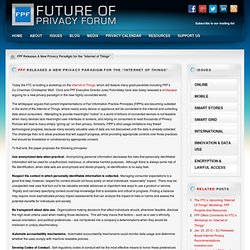
Chris and FPF Executive Director Jules Polonetsky have also today released a whitepaper arguing for a new privacy paradigm in the new highly connected world. The whitepaper argues that current implementations of Fair Information Practice Principles (FIPPs) are becoming outdated in the world of the Internet of Things, where nearly every device or appliance will be connected to the internet and collecting data about consumers. Attempting to provide meaningful “notice” in a world of billions of connected devices is not feasible when many devices lack meaningful user interfaces or screens, and relying on consumers to read thousands of Privacy Policies will lead to many simply “giving up” on their privacy. To that end, the paper proposes the following principles: Use anonymized data when practical.
Be transparent about data use. Videochat: The State of the World on Data Privacy. Data privacy is certainly a hot-button topic, but it's more than just a topic for debate; it's a key to empowering people to extract more value from data and deliver better products and services.
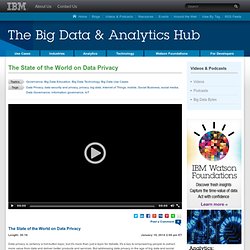
But addressing data privacy in the age of big data and social media is a monumental challenge. Different regions of the world have different approaches and regulations, technologies are being pushed in new and varied ways by mobile computing and the Internet of Things. Given all this, how does one go about managing privacy issues, especially in a global setting? That was the topic for a live videochat, "The State of the World on Data Privacy," featuring two experts on data privacy.
Jules Polonetsky (@JulesPolonetsky) is executive director of the Future of Privacy Forum, a Washington, D.C. Christina Peters is chief privacy officer at IBM, where she is responsible for information policy and practices affecting over 400,000 employees and thousands of clients. Pbd-big_data.pdf. Big Data, Little Privacy? Have you ever clicked accept on a website’s privacy policy without reading it completely—or at all?
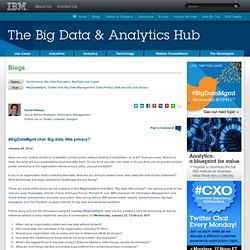
Sure you have. Most of us have. But what are your expectations of privacy after that? Do you think you own your data, or do you think you’ve granted at least partial ownership to the organization whose privacy policy you just accepted? If you’re an organization that’s collecting that data, what are you doing to protect it and, thus, keep the trust of your customers? These are some of the issues we will examine in this #BigDataMgmt chat titled, “Big data, little privacy?” Follow along and join the discussion using the hashtag #BigDataMgmt. When can an organization collect and use data without consent? #BigDataMgmt reference articles Featured Guests Jules Polonetsky (@JulesPolonetsky) is executive director of the Future of Privacy Forum, a Washington, D.C. Vishal Kumar (@VishalTX) is passionate about product management, innovations, assisting startups with their strategic and tactical issues.